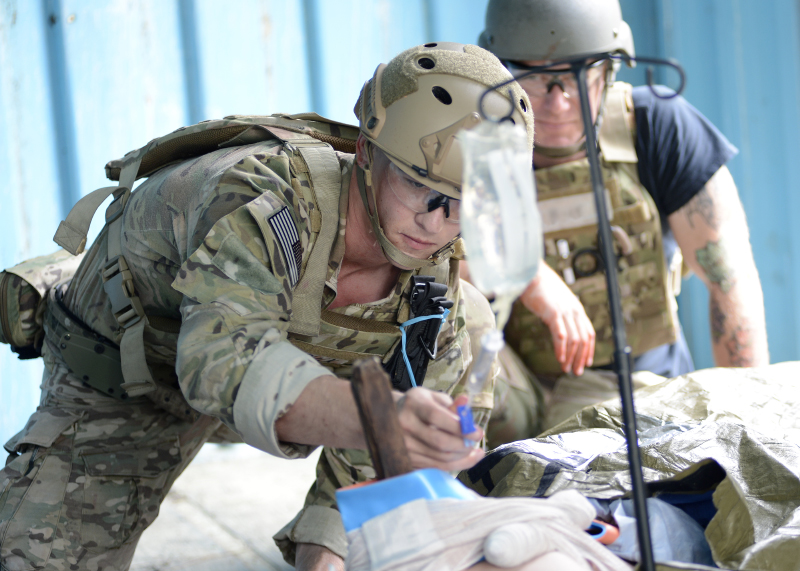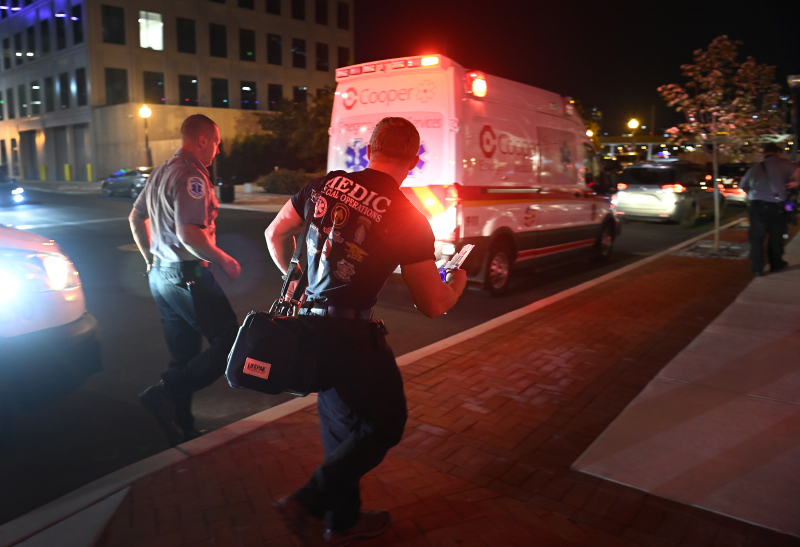The role of special operations combat medics continues to evolve alongside rapid advancements in military medicine. Special operations medics are specially selected Soldiers tasked with the delivery of critical care in complex environments, while also individually embracing opportunities to enhance their medical expertise through higher education. This article details the unique journey of the special operations combat medics enrolled in the Special Operations Civil Affairs Medical Sergeants (SOCAMS) Course, which is offered at the Joint Special Operations Medical Training Center (JSOMTC) at Fort Bragg, North Carolina. SOCAMS is where these medics embark on a distinctive educational path that culminates with a Bachelor of Science in Health Sciences (BSHS) degree in Global Community Health from the Uniformed Services University’s (USU) College of Allied Health Sciences.
01
A Dual Path—Education meets Training
The BSHS degree pathway through the JSOMTC and USU operationalizes Army Regulation (AR) 350-1 by integrating
training and
education. AR 350-1 distinguishes between the two, defining education as “the structured process to impart knowledge through teaching and learning, predominantly in the Institutional and Self Development Training Domain,”
02 and training as “a task or performance basis is used, and specific conditions and standards are used to assess individual and unit proficiency.” AR 350-1 continues to describe education as being “traditionally delivered by an accredited institution and may relate to a current or future mission-related assignment.”
03 While both are vital for personal and professional development, they serve distinct purposes and focus on different aspects of learning. Army training often includes educational elements; however, combining Army training with an accredited institution of higher education provides a more comprehensive and practical learning experience.
The Global Community Health BSHS program is a pioneering initiative requested by the Special Operations Center of Excellence and designed to meet the specific needs of SOCAMS (38W military occupational specialty).
04 This innovative program allows students who complete the Special Operations Combat Medic course the ability to earn an Associate of Science in Health Sciences degree in Emergency Medical Services—Paramedic, followed by a Bachelor degree in Health Sciences after completing the full 38W pathway.
05

Illustration timeline of the 38W Special Operations Combat Medic course. (Illustration provided by U.S. Army)

The intensive 92-week curriculum emphasizes critical areas essential for Civil Affairs operations.
06 Students are trained in medical and veterinary care, preventive medicine, and collaboration with host-nation governments and non-government organizations. The curriculum’s focus on teamwork, adaptability, and critical thinking equips these medics with the skills necessary to navigate the complexities of modern military engagements, where humanitarian considerations often intersect with tactical operations. The USU President approved the Global Community Health BSHS degree program in August 2023. The inaugural cohort of Special Operations Civil Affairs Medical Sergeant, SOCAMS class 23-001, commenced training on Aug. 23, 2023, and graduated on Dec. 20, 2024.
Curriculum Overview
The Global Community Health program provides comprehensive instruction across a wide array of subjects crucial for the multifaceted role of a 38W. Key areas of instruction include civil information management, civil knowledge integration, trauma care, medical information management in challenging environments, medical civil-military operations, civilian engagement, understanding medical needs within a civil context, environmental health assessments, and risks related to food and water security, particularly in regions affected by conflict or disaster. The program also incorporates veterinary sciences and agricultural studies, recognizing the importance of animal health and agricultural stability to overall community health.
This robust curriculum is delivered through didactic instruction, virtual learning, and hands-on, performance-based training. Regionally accredited faculty and staff from the JSOMTC and USU provide education that develops a Soldier's general knowledge, capabilities, and character. Exposure to in-depth academic learning theories and concepts equips students with new skills and knowledge directly applicable to current or future mission-related assignments, ensuring they can translate theoretical understanding into practical operational skills.
 Student in the Special Operations Combat Medic Course at the U.S. Army John F. Kennedy Special Warfare Center and School checks an intravenous bag during field training. (U.S. Army photo by K. Kassens)
Student in the Special Operations Combat Medic Course at the U.S. Army John F. Kennedy Special Warfare Center and School checks an intravenous bag during field training. (U.S. Army photo by K. Kassens)
The program leverages training completed throughout the 38W pathway and accepts transfer credits from previous military training and accredited academic institutions. Students must also complete individual coursework in math and composition, submitting those credits to USU to fulfill the degree plan requirements. Enrolled Soldiers have five years to complete all the requirements and earn the Global Community Health BSHS degree from USU.
Faculty Excellence and Accreditation
The faculty at JSOMTC comprises highly qualified professionals, many of whom are licensed providers with board certifications in their respective fields. Instructors complete formal training through the Special Operations Center of Excellence Faculty Development Course, ensuring they are well-equipped to deliver the specialized content of this unique program. As a satellite campus of the USU, JSOMTC is accredited by the Council on Occupational Education, the Committee on Accreditation of Emergency Medical Services Professionals, and the Middle States Commission on Higher Education.
07,08 This accreditation validates the quality of education and ensures the training meets high standards for both military and civilian healthcare settings.
Bridging Military and Civilian Roles
 A Special Operations Combat Medic Course student from the U.S. Army John F. Kennedy Special Warfare Center and School, responds to a call while working alongside emergency medical technicians from Cooper Trauma Center in Camden, New Jersey. (U.S. Army photo by K. Kassens)
A Special Operations Combat Medic Course student from the U.S. Army John F. Kennedy Special Warfare Center and School, responds to a call while working alongside emergency medical technicians from Cooper Trauma Center in Camden, New Jersey. (U.S. Army photo by K. Kassens)
The Global Community Health BSHS program serves a dual purpose: preparing SOCAMS for immediate military assignments and enhancing their professional standing with host nation medical personnel, Department of State personnel, and medical non-government organizations. A degree from the USU positions medics for success when collaborating with these entities. This educational initiative addresses a critical need within the Army and the broader community by recruiting exceptional talent from across the Army and providing them with advanced medical training and education, fulfilling military requirements, and enriching the healthcare landscape within Civil Affairs and the special operations community. Graduates emerge with enhanced knowledge, skills, and experience, contributing significantly to their capabilities as healthcare providers, in both military and civilian contexts.
Challenges and Triumphs
This academic journey is rigorous, requiring exceptional time management skills and resilience to balance the demands of medical training with academic coursework. Medics must navigate the pressures of both environments, often with long hours of study and practice. However, camaraderie among students and support from attentive faculty foster a positive learning environment. Students consistently report overcoming challenges, mastering complex medical concepts, and applying skills in simulated scenarios, resulting in a profound sense of accomplishment and a commitment to lifelong learning and professional development.
Conclusion
The Global Community Health BSHS program at the JSOMTC represents a significant advancement in the training of special operations combat medics. By bridging the gap between military training and higher education, this initiative enhances the capabilities of these elite healthcare providers and prepares them for the diverse challenges they will face in both military operations and civilian healthcare settings. As the demands of military medicine continue to evolve, integrating education into the training of special operations medics will remain paramount. Investing in education ensures these medics are prepared to save lives on the battlefield and to address the broader humanitarian needs of the communities they serve. This commitment to excellence in medical training and higher education demonstrates the Army's dedication to fostering a new generation of skilled and knowledgeable military healthcare providers within Army special operations.
01 “Bachelor’s Degree,” Uniformed Services University of the Health Sciences, accessed 14 October 2024 from https://cahs.usuhs.edu/academics/bachelors.
02 Headquarters Department of the Army, Army Regulation 350-1 Army Training and Leader Development, 1 June 2025.
03 ibid.
04 Louis M. Radnothy, COL, MC, USA, Dean, Joint Special Operations Medical Training Center letter, Fort Bragg, North Carolina, 29 March 2023.
05 “Associate’s Degree,” Uniformed Services University of the Health Sciences, accessed 14 October 2024 from https://cahs.usuhs.edu/academics/associates.
06 Headquarters Department of the Army, Field Manual 3-57; Civil Affairs Operations, 28 July 2021.
07 “Accreditation,” Uniformed Services University of the Health Sciences, accessed 14 October 2024 from https://cahs.usuhs.edu/about/accreditation.
08 “Uniformed Services University of the Health Sciences Accreditation,” Middle State Commission on Higher Education, accessed 14 October 2024 from https://www.msche.org/institution/0146/.